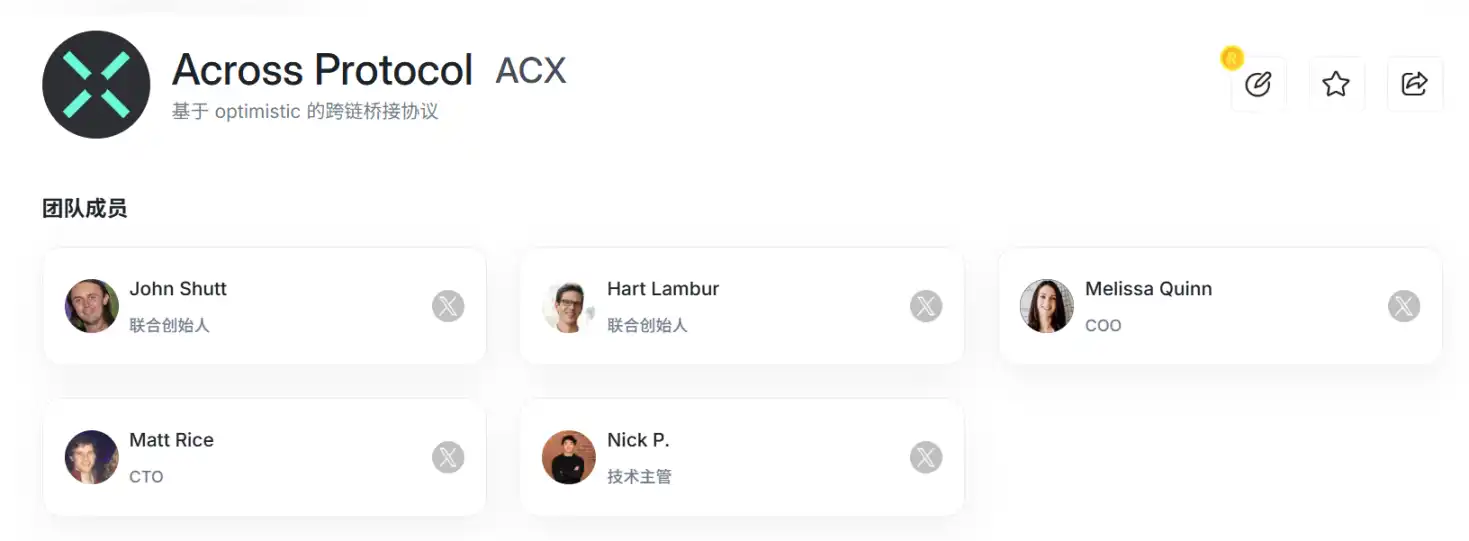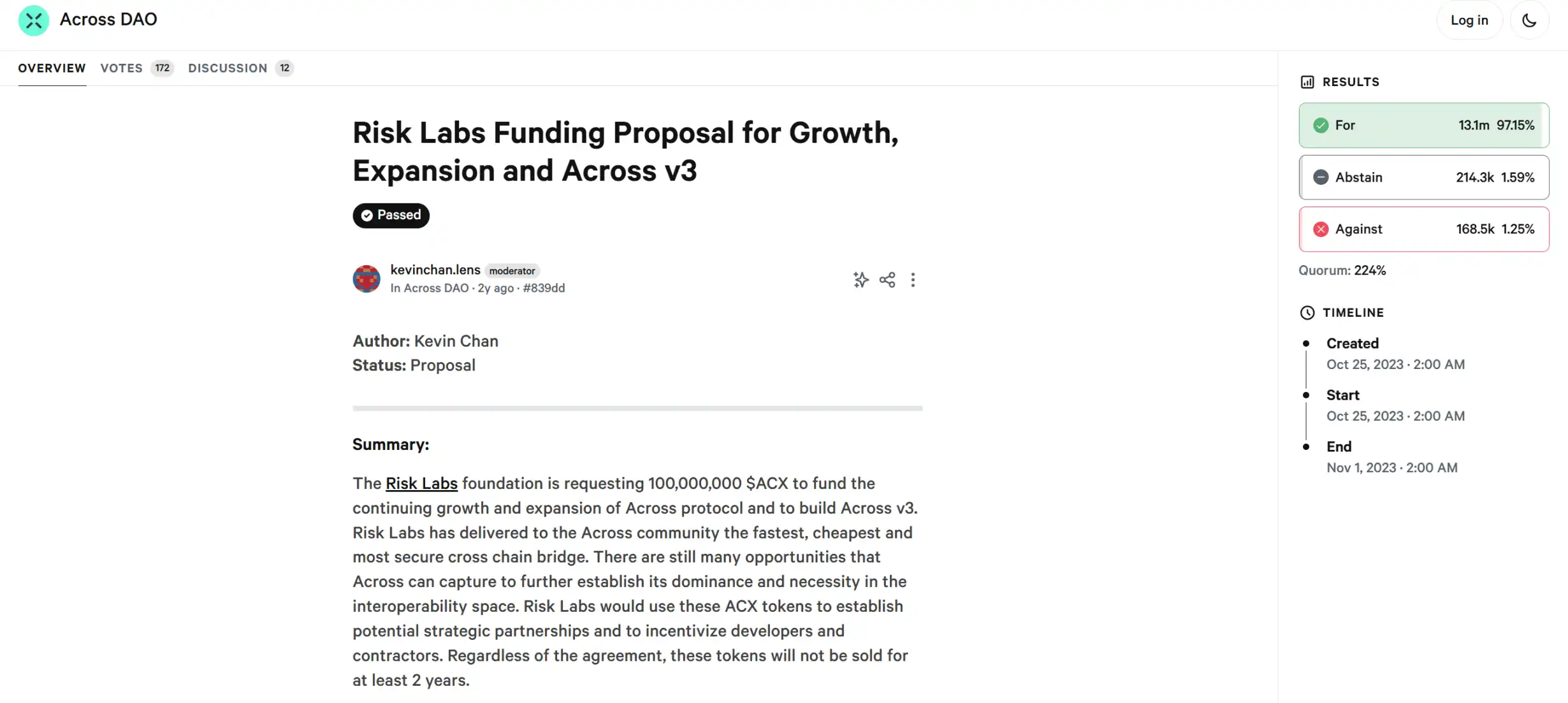Original Title: Across Governance Scandal: Team Manipulates Voting and Misappropriates $23 Million?
Original Author: 1912212.eth, Foresight News
On June 27, as the scandal involving Celestia's founder selling tokens to prepare for a protracted battle temporarily subsided, another project was exposed in a scandal. Glue's founder Ogle publicly accused the cross-chain bridge protocol Across team of manipulating DAO votes and misappropriating up to $23 million in funds. This accusation not only sparked widespread attention from the community but also brought the issues of transparency and security in DAO governance mechanisms back into the spotlight.
What exactly is the Across protocol? How did the project team manipulate votes to achieve the misappropriation of funds?
The Former UMA Team's New Venture
Across is a cross-chain bridge protocol aimed at achieving seamless asset transfers between different blockchains through efficient cross-chain interoperability. As early as the end of 2022, it secured $10 million in funding from investors like Hack VC, and in March 2025, Across Protocol announced it raised $41 million in a token sale led by Paradigm, with participation from Bain Capital Crypto, Coinbase Ventures, Multicoin Capital, and angel investor Sina Habinian, boasting a luxurious lineup of investors.

Its founder, John Shutt, previously served as a senior engineer at UMA, while co-founder Hart Lambur is also a founder of both UMA and Risk Labs, the development organization behind the once-renowned synthetic asset protocol UMA.
Since mid-2023, its token ACX has surged from a low of $0.05 to around $1.80, an increase of nearly 36 times. However, starting from the end of last year, ACX experienced a rapid decline due to negative market conditions, currently falling to around $0.14, a drop of more than 10 times in just six months.
The governance model of Across relies on DAO, allowing users holding governance tokens to participate in proposal voting to determine the allocation of funds and development direction of the protocol. However, the decentralized nature of DAO governance often faces skepticism regarding "centralized manipulation" in practice, which is at the core of Ogle's accusations.
Vote Manipulation and Fund Misappropriation
Ogle elaborated on his accusations against the Across team in a lengthy post. He claimed that the Across team manipulated DAO votes through opaque means, bypassing the community's normal governance processes to transfer $23 million in funds to undisclosed accounts. Here are several key points from Ogle's accusations:
Vote Manipulation: Ogle pointed out that the Across team dominated the voting results of DAO proposals using their substantial governance tokens. The team concentrated votes through multiple associated wallets, creating a false impression of community support, which actually contradicted the decentralized intent of the DAO. This behavior is reminiscent of the "governance attacks" seen in previous projects like Compound DAO and Jupiter DAO.
Fund Misappropriation: Ogle further accused the Across team of manipulating approved proposals to transfer $23 million of DAO funds to accounts not subject to community oversight. He questioned the whereabouts of these funds, stating that there were no public audit records or transparent usage explanations, suggesting a rug pull misappropriation.
Lack of Transparency: Ogle also criticized the Across team for lacking public communication during the governance process. For instance, proposal details were not fully disclosed, and the voting process did not provide real-time on-chain data, making it difficult for community members to verify the legitimacy of the results. He called for Across to publicly disclose the flow of funds and undergo independent third-party audits.
Additionally, Ogle specifically analyzed the detailed process. In October 2023, Kevin Chan, the project lead of the cross-chain protocol, submitted a public proposal to the DAO, proposing to transfer 100 million ACX tokens (currently worth about $15 million) from the DAO to Risk Labs—a private profit-making company of the cross-chain protocol's founder.

On-chain analysis shows that this proposal was actually secretly pushed by Kevin and his team. Although Kevin used his public address "KevinChan.Lens" to propose the funding, he secretly cast a large number of "yes" votes through another wallet "maxodds.eth." Several members of the Risk Labs team seemed to have collectively voted to approve this substantial funding. Another team member, Reinis FRP, also voted "yes" using millions of ACX tokens from multiple secret wallets. The second-largest voting wallet in the entire proposal (accounting for nearly 14% of the total votes) was initially funded by Hart Lambur.
Less than a year later, with no consequences from the first vote, the team returned to request more funds. This time, they asked the DAO for "retrospective funding" of 50 million ACX, approximately $7.5 million. Similarly, Kevin's secret wallet handled most of the voting work: "maxodds.eth" and a newly funded wallet contributed 44% of the "yes" votes.
Ogle expressed dissatisfaction with this behavior, stating, "In any other industry—whether it be a public company, a nonprofit organization, a government agency, or any other institution—there are strict rules prohibiting so-called 'self-dealing' and other regulations on how we should act to prevent other breaches of duty."
Some community members supported his view, expressing concern over the current state of DAO governance; others questioned Ogle's motives, suspecting that his accusations were aimed at promoting Glue's competitive strategy. Glue is a security-focused public chain with relatively low visibility and popularity in the crypto community.
As of now, the Across team has not formally responded to the accusations.
Intractable Issues in DAO Governance
Ogle's accusations are not an isolated incident but rather a reflection of the long-standing issues in DAO governance. DAOs (Decentralized Autonomous Organizations), as an innovative product of blockchain technology, aim to achieve decentralized decision-making through smart contracts and token voting.
However, DAO governance in practice often deviates from ideals, exposing the following issues:
Centralization of Power: Although DAOs aim for decentralization, unequal token distribution often leads to a few "whales" controlling voting outcomes. For example, members of Jupiter DAO have complained that the team manipulated governance by holding large amounts of tokens, undermining the community's voice. Similarly, the "Golden Boys" incident in Compound DAO exposed how a few token holders exploited proposals to misappropriate $24 million. Lack of Voting Transparency: Many DAOs lack on-chain verifiable transparency in their voting processes, making it difficult for community members to track actual voting behavior. Research shows that current DAO governance protocols generally fail to ensure the long-term privacy of ballots, and voting records may even be made public after voting ends, increasing the risk of manipulation and coercion. Security Risks of Funds: DAO treasuries often hold substantial funds, making them targets for hackers and internal attackers. The 2016 DAO hack is a classic case where attackers exploited a smart contract vulnerability to steal $50 million worth of Ethereum, forcing the Ethereum community to undergo a hard fork. In recent years, similar flash loan attacks on Beanstalk DAO have also shown that governance vulnerabilities can lead to the instant depletion of treasury funds. Legal and Liability Ambiguities: The decentralized nature of DAOs makes their legal status ambiguous, and members may face unexpected legal liabilities. For instance, in the 2023 Sarcuni v. bZx DAO case, a U.S. court ruled that DAO members could be considered general partners and held jointly liable for the protocol's losses. This raises alarms about the legality and compliance of DAOs.
Given the current intractable issues facing DAOs, Ogle pessimistically believes that "almost all DAOs in the cryptocurrency space are outright scams, or at least disguises. I think the insider threats faced by cryptocurrency investors are far greater than those from outsiders (like hackers)."
Conclusion
In the face of the challenges of DAO governance, the industry needs to seek improvements from three levels: technology, mechanisms, and culture. On the technical level, more secure smart contracts and voting protocols can be developed. For example, using zero-knowledge proof (ZKP) technology can protect voting privacy while maintaining on-chain verifiability; multi-signature and time-lock mechanisms can reduce the risk of treasury funds being stolen. On the mechanism level, optimizing token distribution and voting weight design can prevent "whales" from dominating. For instance, introducing quadratic voting or reputation systems can give more voice to active community members. Additionally, mandating independent audits of proposals and fund flows can enhance transparency.
Ogle's accusations against Across serve as a wake-up call for the blockchain governance ecosystem. DAOs, as ideal vehicles for decentralization, carry the community's expectations for fairness and transparency, but their development still faces numerous challenges. The industry should take this incident as an opportunity to accelerate the iteration and improvement of governance mechanisms.
免责声明:本文章仅代表作者个人观点,不代表本平台的立场和观点。本文章仅供信息分享,不构成对任何人的任何投资建议。用户与作者之间的任何争议,与本平台无关。如网页中刊载的文章或图片涉及侵权,请提供相关的权利证明和身份证明发送邮件到support@aicoin.com,本平台相关工作人员将会进行核查。




